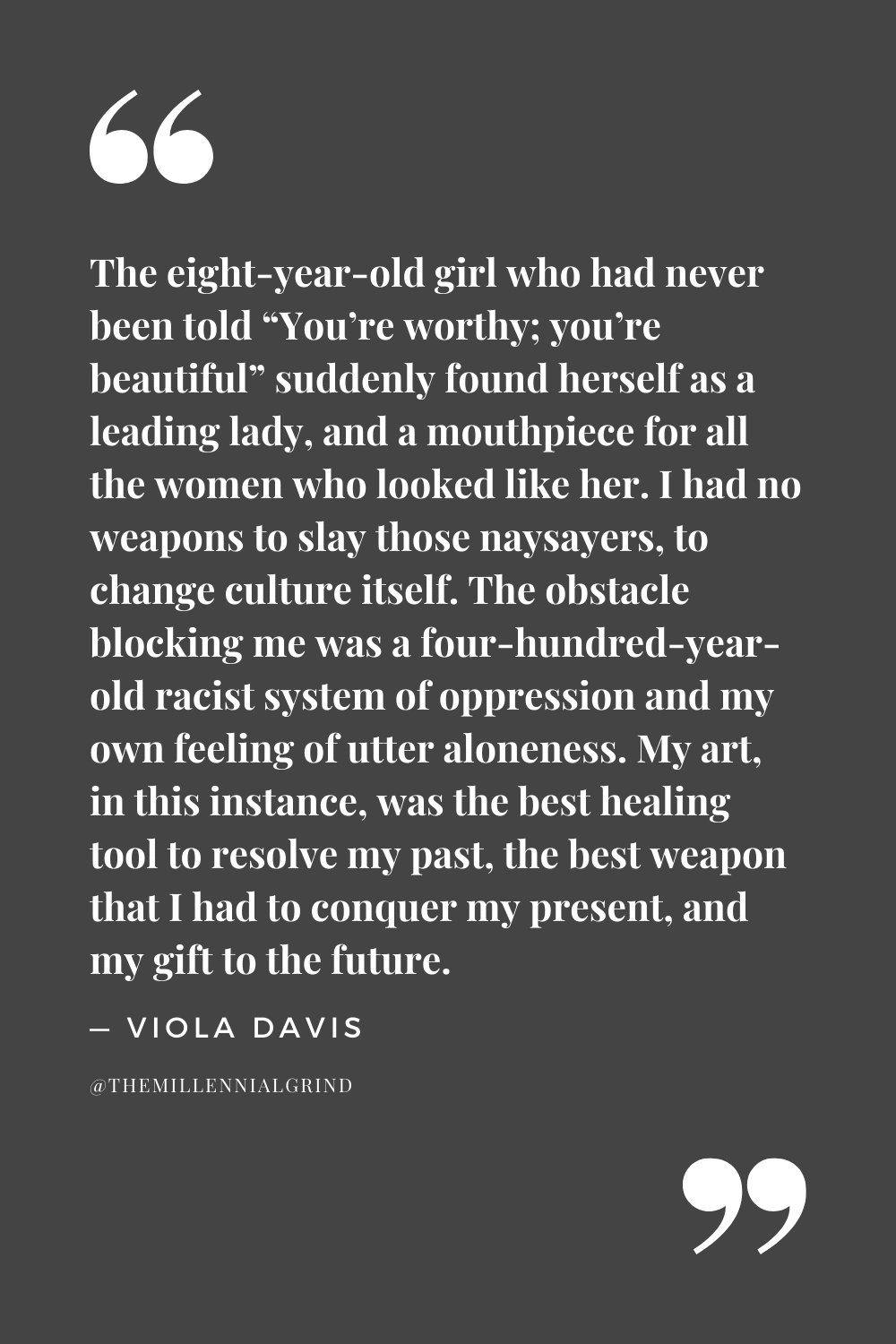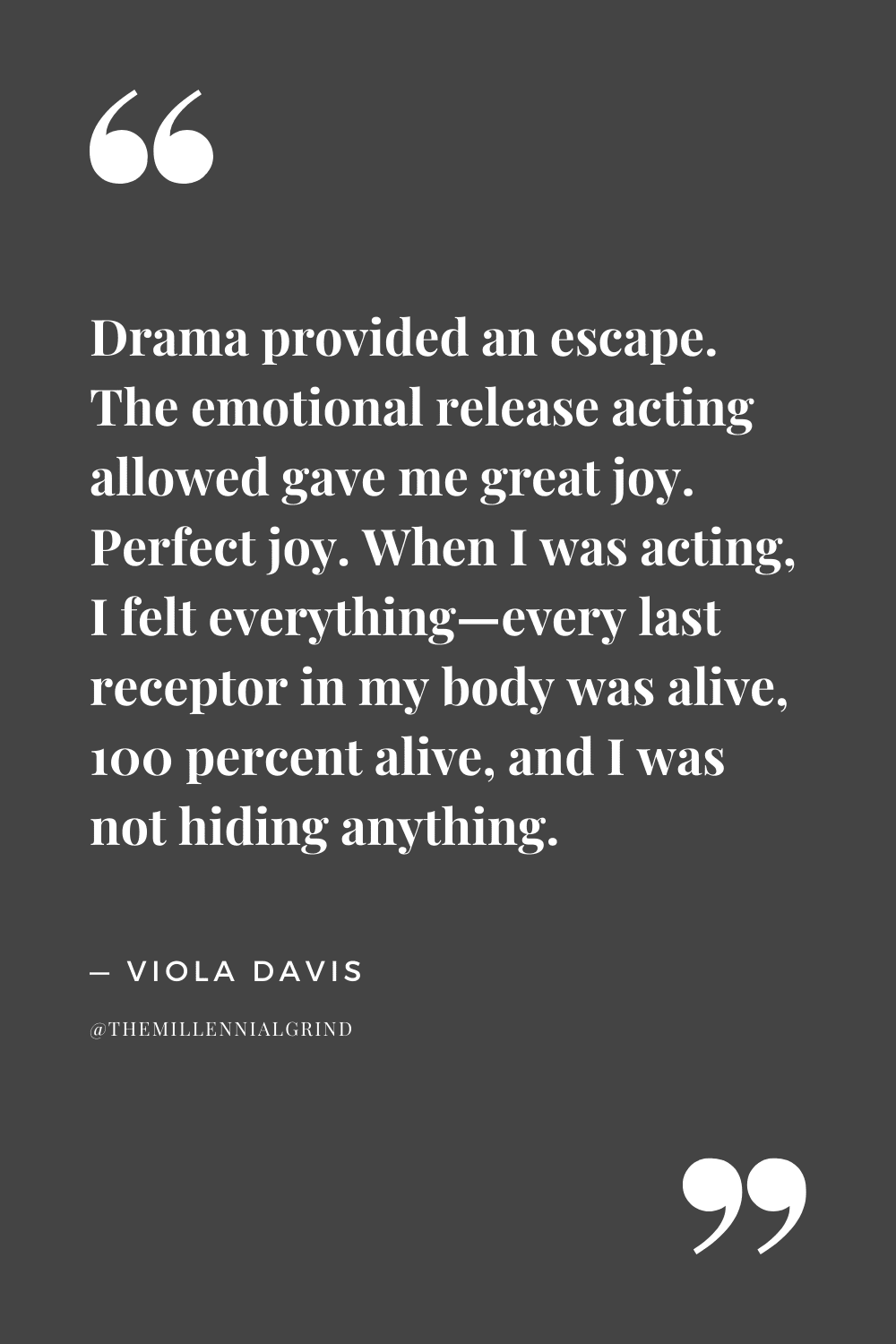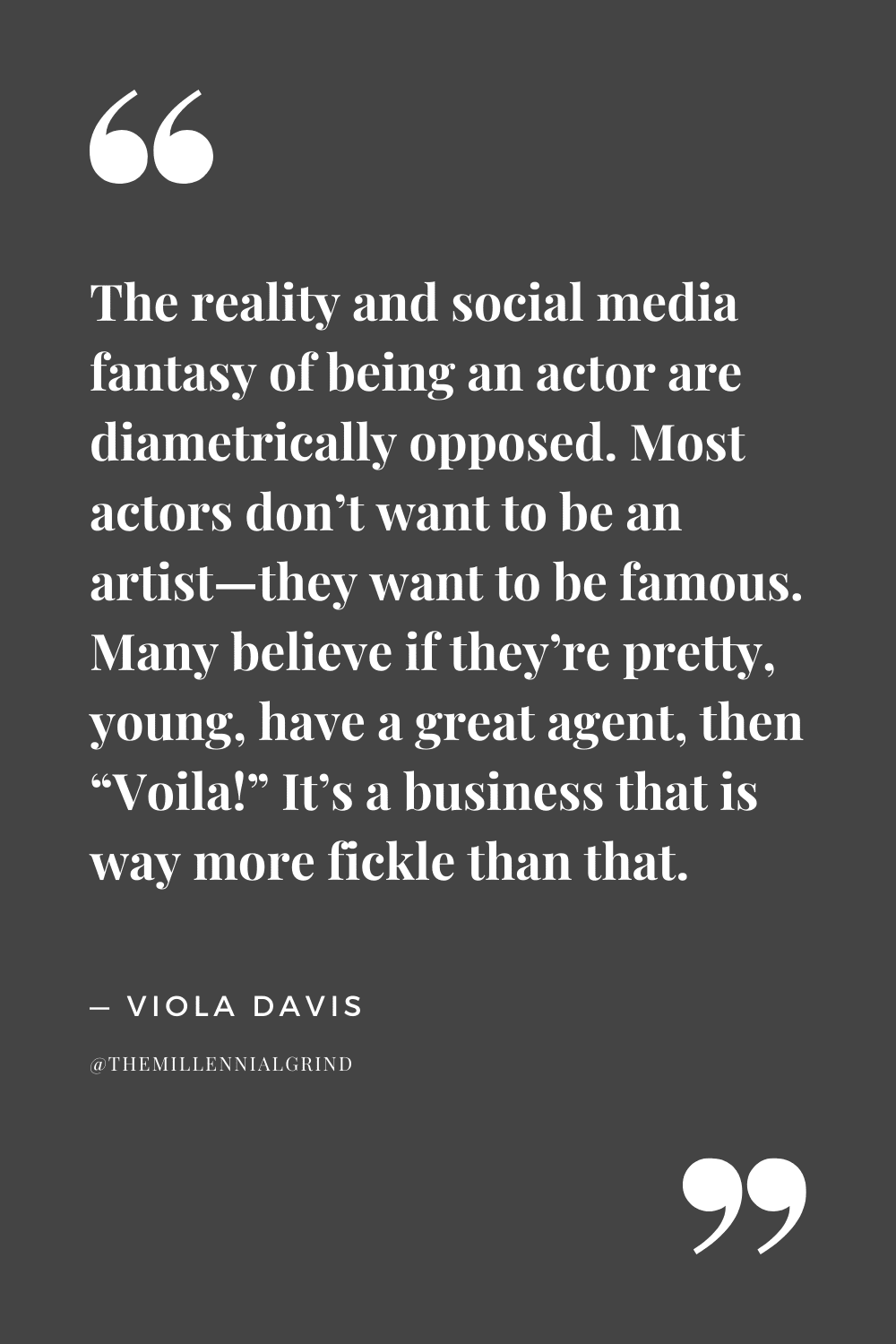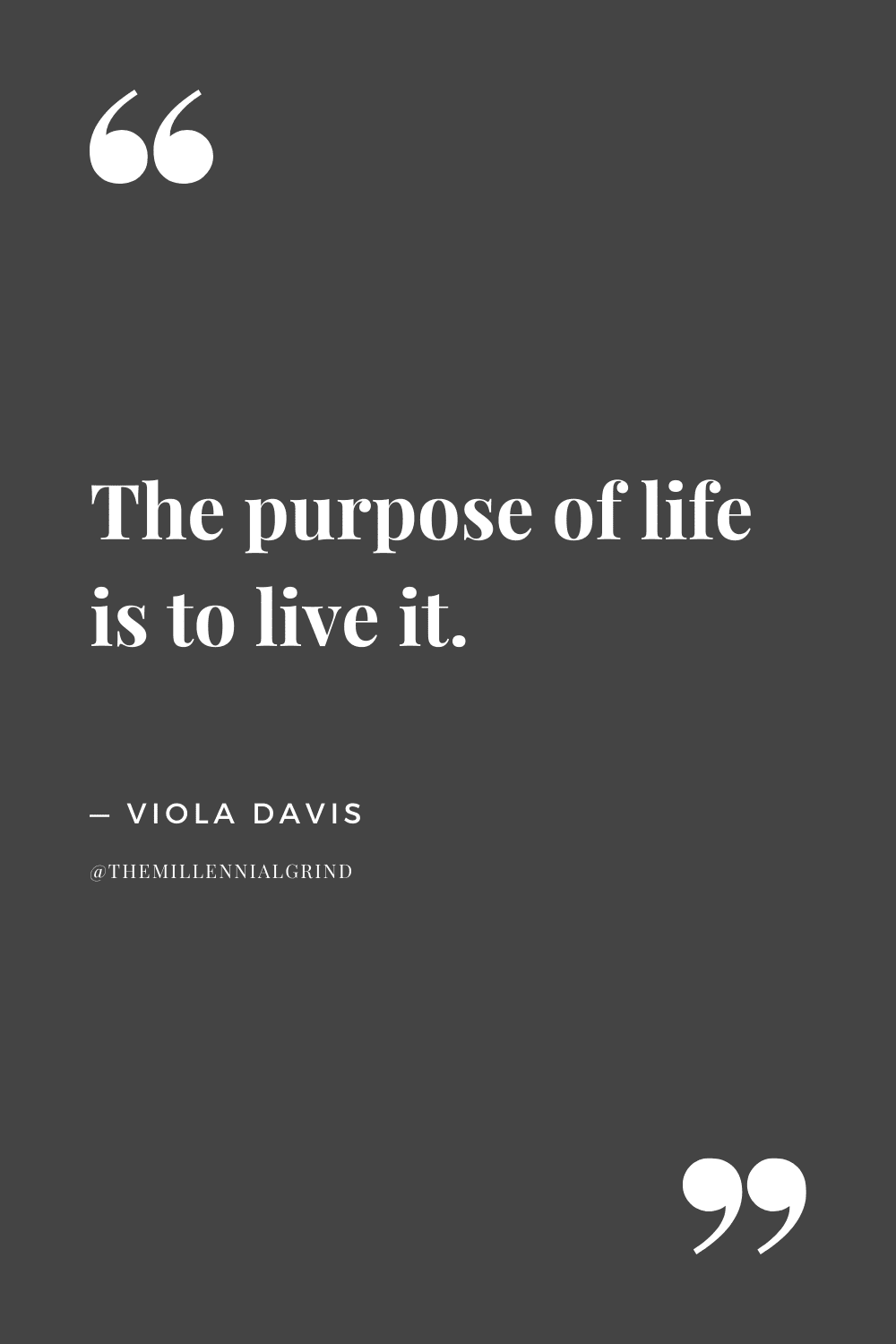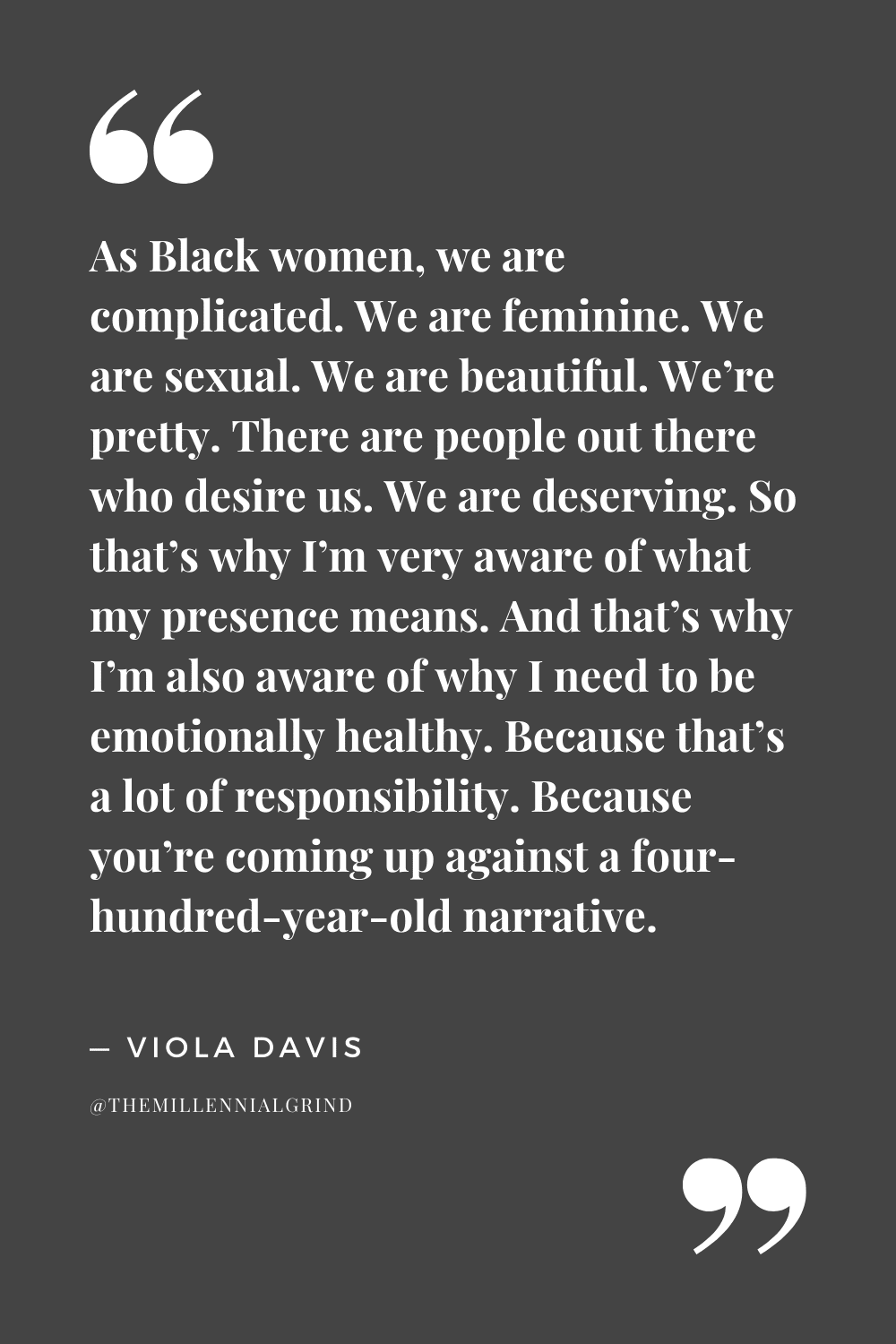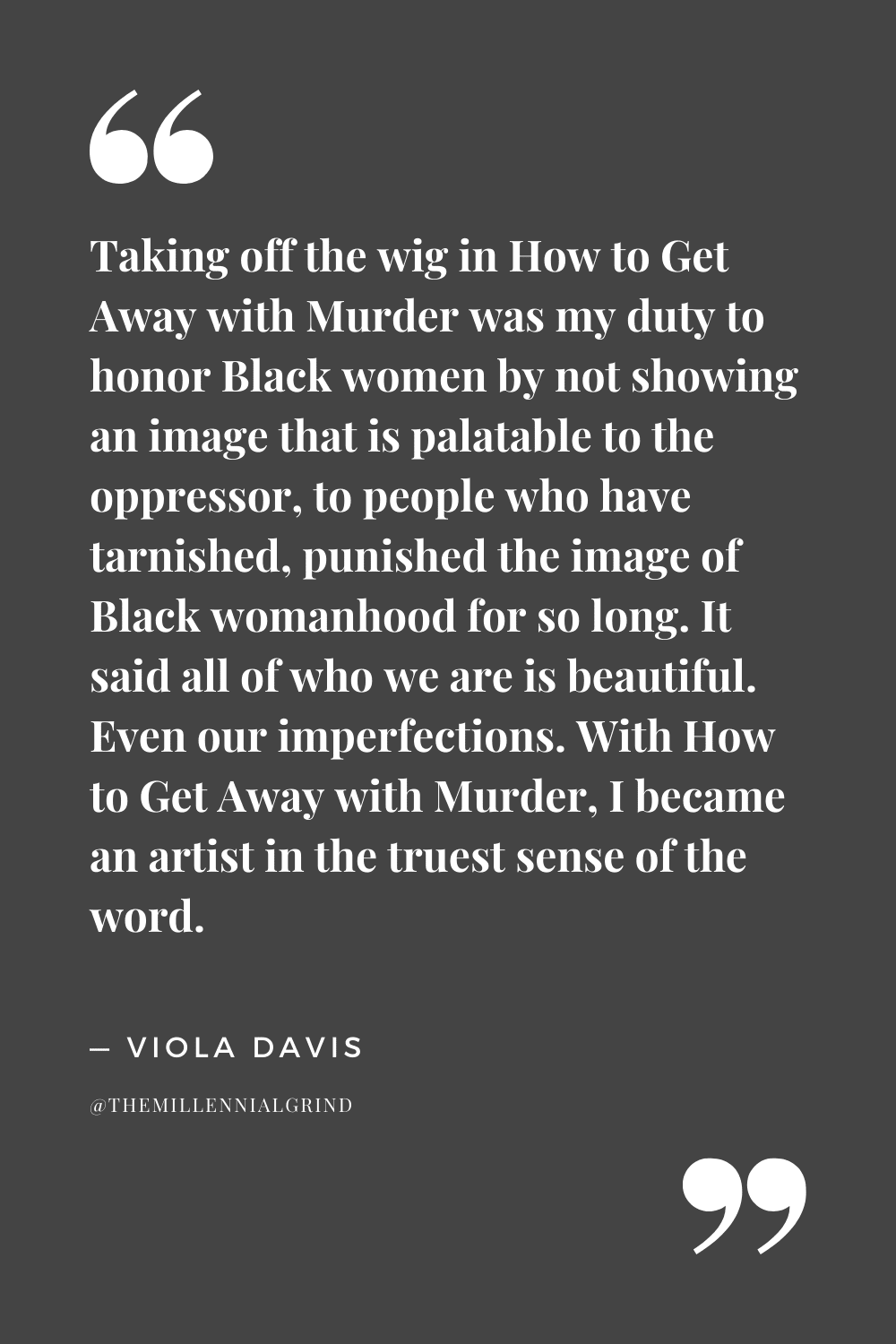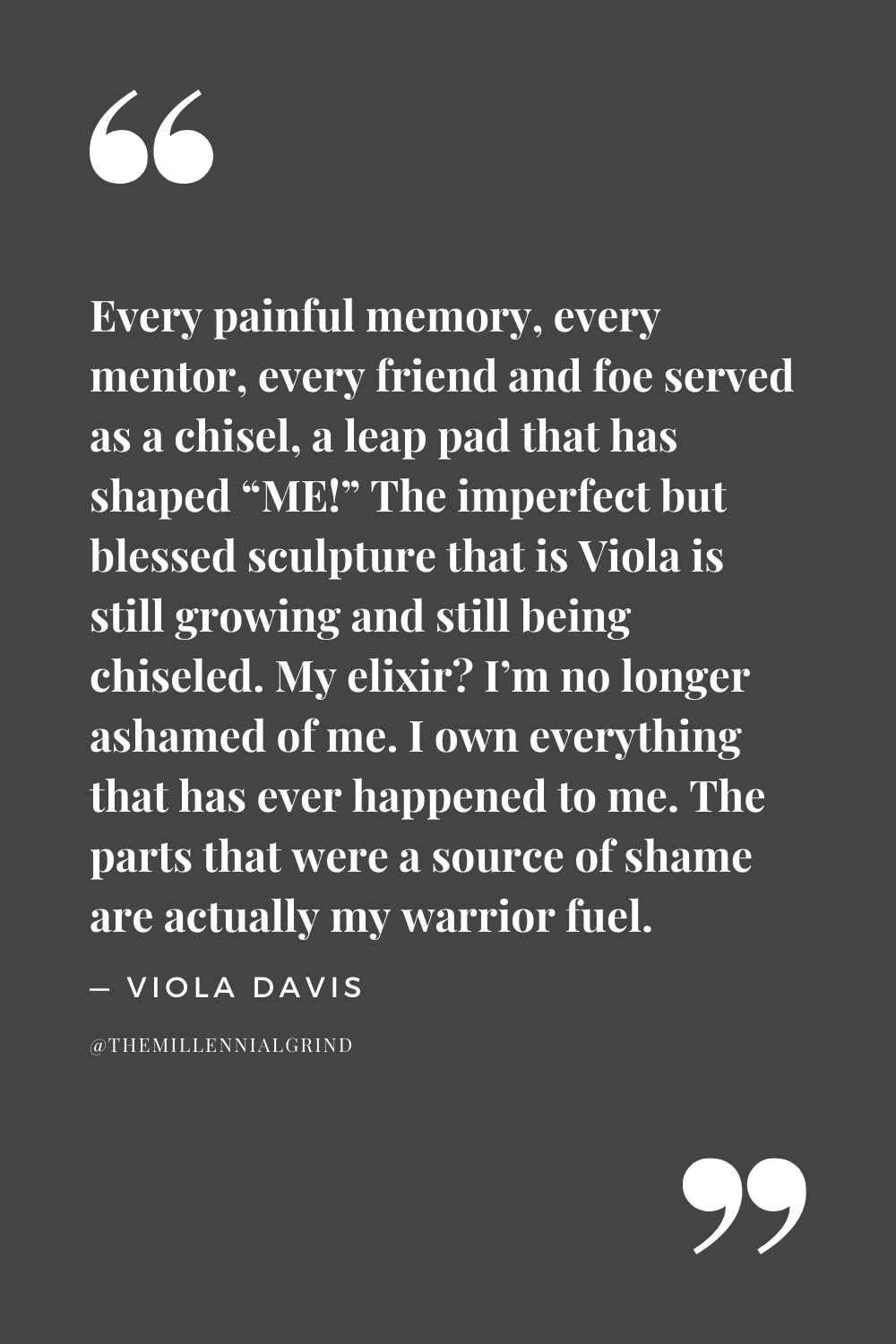Finding Me is Viola Davis’s memoir detailing her journey from a crumbling apartment in Central Falls, Rhode Island, to the stage in New York City, and beyond.
Finding Me is a deep reflection, a promise, and a love letter of sorts to self.
It will inspire you to light up your own life with creative expression and rediscover who you were before the world put a label on you.
Scroll down to read 30 of the best quotes from Finding Me by Viola Davis.
Get The Book: Finding Me by Viola Davis is available now on Amazon.
Quotes from Finding Me by Viola Davis
The eight-year-old girl who had never been told “You’re worthy; you’re beautiful” suddenly found herself as a leading lady, and a mouthpiece for all the women who looked like her. I had no weapons to slay those naysayers, to change culture itself. The obstacle blocking me was a four-hundred-year-old racist system of oppression and my own feeling of utter aloneness. My art, in this instance, was the best healing tool to resolve my past, the best weapon that I had to conquer my present, and my gift to the future.

- Looking back on that night when I stood up to my dad and wiped up my mom’s blood, I knew my life would be a fight. And I realized this: I had it in me.
- Achieving, becoming “somebody,” became my idea of being alive. I felt that achievement could detox the bad shit. It would detox the poverty. It would detox the fact that I felt less-than, being the only Black family in Central Falls. I could be reborn a successful person. I wanted to achieve more than what my mother had.
- I was looking for something or someone to define me. To infuse in me self-love, acceptance. To show me how to live. To show me I was all right.
- Drama provided an escape. The emotional release acting allowed gave me great joy. Perfect joy. When I was acting, I felt everything—every last receptor in my body was alive, 100 percent alive, and I was not hiding anything.

I held on to what I had, all that I had, the team effort with my older sisters. That preserved me. We were a girl-posse, fighting, clawing our way out of the invisibility of poverty and a world where we didn’t fit in. The world was our enemy. We were survivors.
- My lesson from Upward Bound was you have to open your mouth and own your friggin’ story. That terrified me more than rats.
- If I created a fable of my life, a fantasy, I see myself finally meeting God, gushing, crying, thanking the Almighty for the accolades, a fabulous husband, beautiful daughter, my journey from nothing to Hollywood, awards, travel. I can clearly see the Lord’s face, staring at me, taking me in and saying, “You never thanked me for creating you as YOU.”
- Working hard is great when it’s motivated by passion and love and enthusiasm. But working hard when it’s motivated by deprivation is not pleasant.
The reality and social media fantasy of being an actor are diametrically opposed. Most actors don’t want to be an artist—they want to be famous. Many believe if they’re pretty, young, have a great agent, then “Voila!” It’s a business that is way more fickle than that.

- I was about to go into the belly of the beast. Juilliard was about to rip apart my world. I would come face-to-face not with God, but with me.
- Everybody has secrets. Everybody. I guess the difference is that we either die with them and let them eat us up, or we put them out there, wrestle with them (or they wrestle with us) until we . . . reconcile. Secrets are what swallow us.
- I just wanted to find home. Not find a home but find home. A safe place sanctuary that was peaceful, nurturing, reliable . . . and filled with love.
- If you are that character actor out there getting the leftovers, it’s very hard to compete with the actor who’s getting the filet mignon of roles. It just is.
- The purpose of life is to live it.

- My career mirrored my childhood. My Blackness was as much an issue on the stage and screen as it was in my childhood. It became apparent to me that all those things that were within me still needed healing, and it also became frighteningly obvious that God was using me to be a leader in the area where I very much felt a victim.
- Every character you play forces you to explore your brokenness.
- Please note the word I used to describe Annalise: sexualized. Not sexy. There’s a difference. I hate the word sexy, because sexy is a mask that you put on. It lives in women becoming a symbol of male desirability. It’s not authentic. It’s self-conscious. Sexualized is just another facet of you. It’s a part of your self-actualization, maybe even part of your DNA. Black women who look like me are not usually allowed to be sexualized because “we don’t think you’re attractive.”
- Our level of dreaming, of self-love and acceptance, is equal to the love, support, and permission of the images around us.
As Black women, we are complicated. We are feminine. We are sexual. We are beautiful. We’re pretty. There are people out there who desire us. We are deserving. So that’s why I’m very aware of what my presence means. And that’s why I’m also aware of why I need to be emotionally healthy. Because that’s a lot of responsibility. Because you’re coming up against a four-hundred-year-old narrative.

- I felt like I had two choices: either apologize for who I was and try to alter how I looked to meet their standards and try to fit in to what the masses were saying; or I could stay true to myself and make Annalise me, what I look like, what I sound like. I was at the point in my life where I chose me. That was a huge busting-out moment. I achieved on a different level than awards. I was finding me.
- I’m aware of what my presence out there means to Black women. And how important it is to speak my truth. Because here’s the thing you can’t take away or replace: You can’t replace my authentic story with a racist one.
- Annalise Keating released in me the obstacles blocking me from realizing my worth and power as a woman.
All I’ve got is me. And that is enough.
Taking off the wig in How to Get Away with Murder was my duty to honor Black women by not showing an image that is palatable to the oppressor, to people who have tarnished, punished the image of Black womanhood for so long. It said all of who we are is beautiful. Even our imperfections. With How to Get Away with Murder, I became an artist in the truest sense of the word.

- Black actresses don’t often get roles where their pathology and womanhood are fully explored. We’re the fourth, fifth, ninth lead. We come on and say a few powerful and sassy words and then your ass is gone and that’s your only contribution. But Fences was a well-made narrative, with the right director to pull it all together.
- I had a goal. I saw it. I worked for it. I achieved it. It’s not so much about getting the Oscar for Fences but rather for shooting a movie that gave me so much joy. It almost was like a fireworks display. Even if the Oscar had never happened, it would have still been a defining moment. It was an overflow of blessings that I could not even possibly have imagined for myself.
- What I have realized since is that those moments of feeling alive are part of a continuum. You find that moment. You bask in it. Then as soon as it passes, life becomes about chasing the next moment. I now understand that life, and living it, is more about being present. I’m now aware that the not-so-happy memories lie in wait; but the hope and the joy also lie in wait.
Memory is powerful. Powerful hardships as well as powerful successes make up a life fully lived . . . my life. My dearest joy is the joyful moments and memories of loving and being present in my daughter’s growth and development, the special relationship and memories of pure joy just loving my husband, cherishing the life that we continue to build, and moments and memories of my life as a working actor.
- Every painful memory, every mentor, every friend and foe served as a chisel, a leap pad that has shaped “ME!” The imperfect but blessed sculpture that is Viola is still growing and still being chiseled. My elixir? I’m no longer ashamed of me. I own everything that has ever happened to me. The parts that were a source of shame are actually my warrior fuel. I see people—the way they walk, talk, laugh, and grieve, and their silence—in a way that is hyperfocused because of my past. I’m an artist because there’s no separation from me and every human being that has passed through the world including my mom. I have a great deal of compassion for other people, but mostly for myself. That would not be the case if I did not reconcile that little eight-year-old girl and FIND ME.

READ NEXT: 30 Quotes from How to Be an Antiracist by Ibram X. Kendi
